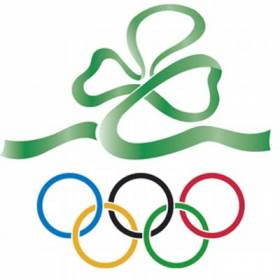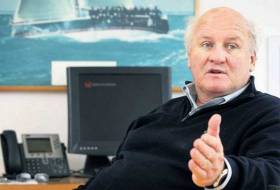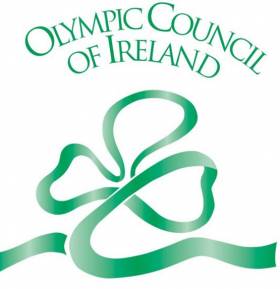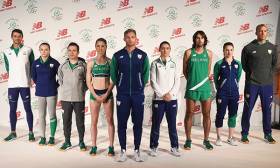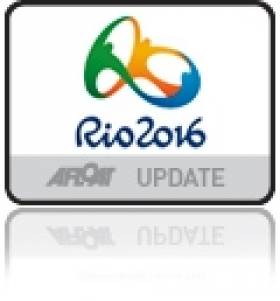Displaying items by tag: Olympic Council of Ireland
Olympic Council of Ireland Appoints New CEO
The Olympic Council of Ireland (OCI) has announced Peter Sherrard as its new Chief Executive Officer (CEO), effective May 2018.
Sherrard joins the OCI from the Football Association of Ireland where he is Operations Director with responsibility for International Team Operations and Match Operations.
Sherrard has held a number of management positions during his career including Market Manager for Ryanair in Italy, Head of Communications at Ryanair, Director of Communications at the FAI, Interim Commercial Director at the FAI, and his current position, Operations Director at the FAI, which he has held since 2014. In this role he is responsible for International Team Operations and Match Operations and was responsible for team preparations at UEFA EURO 2016. Originally from Newcastle Co Down and a graduate of Trinity College Dublin, he is a fluent French and Italian speaker having lived and worked in both countries and he has ten years of experience within Irish Sport.
Commenting on Mr Sherrard’s appointment, the President of the OCI Ms Sarah Keane said:
“We are very pleased that we have been successful in attracting a person of the calibre and experience of Peter to the Olympic Council of Ireland. His hands on experience and leadership skills will be of great value to us as we continue to pursue our athlete centred programme of reform. With the recent launch of our new strategy Peter is starting at a time of real growth and development for the Olympic movement in Ireland. He will lead our journey towards making a real difference and adding significant value to Irish Olympic sport. Irish Olympians inspire the Nation and we want to enhance and support our athletes, coaches, and Federations to deliver on their Olympic goals, dreams and ambitions. On behalf of the Board and staff of the OCI we look forward to working with Peter to deliver for our athletes, Member Federations and the Irish sporting public into the future.”
Speaking on the announcement of his appointment today Peter Sherrard said;
“I am delighted to have been appointed CEO at this exciting time of growth and change at the OCI. I look forward to working with the Board and staff of the OCI to build on the good work of the past 12 months. I share the Board’s commitment to placing athletes and Federations at the centre of everything we do at the OCI. With the Winter Games currently underway in Pyeongchang and the 2020 Summer Games in Tokyo fast approaching I am committed to working with Team Ireland and our partners to help deliver world class support for our athletes.”
Sailing's Colm Barrington was voted with a clear majority to the position of first Vice–President at last night's ground breaking Olympic Council of Ireland (OCI) egm at the Conrad Hotel in Dublin.
After three decades of rule by former president Pat Hickey, a new era in the Council dawned last night with landslide victories for swimming's Sarah Keane and Barrington.
The Irish Sailing Association (ISA) nominated Barrington (70) as a candidate for 'First Vice President'. The Irish sailing champion and former Aer Lingus Chairman ran in support of Sarah Keane's bid to be OCI President and her reform programme.
Big reforms are on the way if Barrington's pre-election pledges in an Afloat.ie interview is anything to go by. Barrington was elected by a clear majority of 29 votes, the same as Keane.
Speaking after last night’s election result Keane commented “I feel humbled and privileged to have been elected as President of the OCI this evening. I am grateful for the support and confidence shown to me by the Olympic Sports Federations and I look forward to working with them the other newly elected officers and Executive Committee members to reform and rebuild the OCI after what has been a very difficult few months for the Olympic movement in Ireland.
Barrington, a member of the Royal Irish Yacht Club, served for 12 years as Chairman of the ISA's Olympic Group stepping down after Rio.
Barrington continues to Chair the Irish Sailing Foundation, the Olympic fundraising body for sailing, established by him in 2015.
He maintains Ireland’s success rate at the Olympic Games is not good enough, particularly for a 'sports–mad and relatively well–off nation'. Read his interview with Afloat.ie here
Brazilian Police Raid OCI Office at Olympic Village
Early this morning in Rio, Brazilian police arrived at the Olympic Council of Ireland (OCI) offices in the Olympic village and at OCI accommodation outside of the village. They were met by OCI personnel. No arrests were made. The police took possession of their passports along with their phones and laptops. The OCI personnel were asked to present for questioning at a local police station on Tuesday (23rd August) next. They agreed to do so.
The OCI had an allocation of unused official tickets in their offices which had been made available for athletes’ families and friends. The police also took possession of these tickets, according to an OCI press statement.
Pat Hickey, who has temporarily stood down as president of the Olympic Council of Ireland, was arrested at his hotel early on Wednesday morning, by police from the Rio Police fraud unit.
He is facing three charges of facilitating ticket touting, formation of a cartel and ambush or illicit marketing.
This evening the Executive Committee of the Olympic Council of Ireland met for the first time in person since the Games began in Rio. The Committee discussed recent events in Rio regarding ticketing arrangements at the Games which it takes very seriously.
The Executive Committee made the following decisions:
· They appointed a three person crisis management subcommittee to lead the Council’s response to the recent events in Rio. This group comprises Sarah Keane (Swim Ireland), Prof Ciaran O’Cathain (Athletics Ireland) and Robert Norwood (Snowsports Association of Ireland).
· The subcommittee will appoint an international accountancy firm to conduct an independent review of ticketing arrangements in Rio. The firm will be selected this week and its work will begin immediately and its terms of reference will be published.
· The report prepared by the firm will be presented to the judge who will chair the State inquiry into the OCI’s handling of ticketing at the Rio Olympics.
Irish Olympic Team Kit for Rio Launched
New Balance and the Olympic Council of Ireland officially unveiled the Team Ireland Olympic kit in Dublin today.
The official launch event, held at Smock Alley in Dublin, gave attendees a first look at the kit which Team Ireland will wear at the 2016 Summer Olympic Games in Rio de Janeiro. The team kit features colours inspired by Ireland's presidential blue in combination with the country's traditional green, white and orange.
Attendees to the event were given access to Team Ireland stars including:
· Thomas Barr, New Balance sponsored track and field athlete
· Ciara Mageean, New Balance sponsored middle distance runner
· Katie Taylor, boxer
· Ellis O'Reilly, gymnast
· Oliver Dingley, diver
· Arthur Lanigan O'Keefe, pentathlete
· Davey Harte, hockey goalkeeper
· Chloe Magee, badminton player
Mick Clohisey, marathon runner
Team Ireland will wear the New Balance custom high performance apparel for use in competition and warm up; and leisurewear for medal ceremonies, travelling and public appearances. The new kit includes items such as singlets, crops, sleeveless tops, briefs, shorts and tights.
The kit incorporates New Balance’s ultra-lightweight fabrics and technologies that enhance fit, utilise minimal construction, are quick drying and provide superior support.
Deirdre Fitzgerald, New Balance Vice President, Apparel, said, “We are incredibly proud of the innovative design and performance technologies as well as the lifestyle elements that have gone into creating this year’s Team Ireland Olympic kit. We understand how important the right kit is to an athlete’s performance, and we can’t wait to see what Team Ireland achieves on the world stage this summer.”
Pat Hickey, President of the Olympic Council of Ireland, said: “We have been working with New Balance for a number of years now, and we are delighted to have New Balance’s continued support.
“We couldn’t be happier with the new kit, and we have no doubt it will help support our athletes as they embark on their journey to success in Rio this summer.”
New Balance has been the official apparel and footwear sponsor of the Olympic Council of Ireland since 2013 when they entered into a multi-year sponsorship deal.
OCI Seek Supporting Evidence from ISA on Olympic Sailing Waters Pollution
#oci – The Olympic Council of Ireland (OCI) has responded to claims by the Irish Sailing Association that the 2016 Olympic waters are a 'health hazard'. OCI president Pat Hickey, who is a member of the International Olympic Committee's, Rio 2016 Coordination Commission told the Irish Times he has not heard of this level of pollution. The OCI is to seek supporting evidence from the ISA about the problem.
Sailors, who have been to training camps in and around the Olympic course, have described water that was heavily contaminated with sewage and believe it is a health risk.
In a statement released yesterday, the OCI said they will address the Irish sailors' concerns. "The Irish Sailing High Performance Team did not consult with the Olympic Council of Ireland on this matter so the OCI would need to ascertain the full extent of their concerns.
The Irish Times has much more on the story here.


























